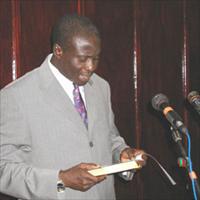Finance Secy Outlines Government Draft Budget Before NA

The Secretary of State for Finance and Economic Affairs, Musa Bala Gaye, on Monday, 3rd December 2007 presented a summary of the estimates of revenue, recurrent and development expenditures for the fiscal year 2008 before members of the National Assembly.
In a six-page report, the government’s fiscal strategy for the year highlighted issues of continuity expected to foster growth and development, by according high priority to those sectors that can assist government efforts to alleviate poverty in this country.
Moving the motion before deputies for consideration and approval, the Secretary of State for Finance and Economic Affairs said that the key parameters of the macro-economic achievements and the attainment of The Gambia’s economic and social objectives are that growth will remain solid at between 6-7 percent, inflation will be below 5%, domestic debt to GDP ratio and the current account deficit to be reduced, and international reserves maintained at a legal equivalent to about 4 months of imports.
According to Secy Bala Gaye, the 2008 budget projects total revenues and grants of D4, 476 million. Of this, he continued, domestic revenues will be D3, 771 million, 14 percent increase over the 2007 budget figure of D3, 322 million.
“Expenditure and net lending for 2008 is projected at D5, 205 million, 15 percent higher than the 2007 budget figure of D4, 512 million. The increase is on account of the use of HIPC/MDRI debt relief resources of D502 million, and also part of privatization proceeds of D390 from the sale of 50 percent shares in Gamtel/Gamcel to finance increased investment expenditures in 2008.
This, Secy Gaye added, is therefore an upsurge in current expenditure of 11 percent, and capital expenditure of 21 percent. “Recurrent expenditure has increased from D2, 531 million in 2007 to D2, 812 million in 2008. Out of total recurrent expenditures, personnel emoluments amounts to D918 million, or 32 percent, other charges D1,143 million, or 46.6 percent, and interest payments on external and domestic debt account for D622 million or 22 percent,” he said.
The Finance and Economic Affairs Secy further re-echoed government’s goal in reducing poverty and meet all the Millennium Development Goals on the basis of sustained economic growth and macro-economic stability which, he added, should be underpinned by fiscal policy that seeks to promote fiscal discipline, efficiency and effectiveness in spending, with the necessary complementary monetary policy.
“In order to meet these ultimate goals much easier, government has scaled up the share of government local funds spent on poverty programmes to about 46 percent in the 2008 budget,” Secy Gaye revealed.
 Back and Next - Back and Next
Back and Next - Back and Next See Also - See Also
See Also - See Also